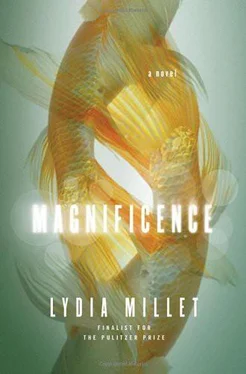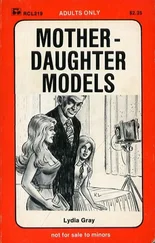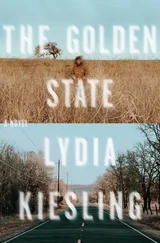So she called a cleaning crew to mop and vacuum and dust the mounts; she placed strategic vases of flowers. She enlisted Casey’s help with the groceries and they bought prepared foods in plastic trays, frozen appetizers in cardboard boxes from Costco. In the unlikely event that Steven and Tommy mistook the hummus and dips for gourmet fare, she planned to leave the empty containers, with price tags showing, piled on the kitchen counter. The slovenliness of the gesture would irritate her, but she was nervous enough for petty schemes. Would it make a difference to them? No doubt it would not: but it made a difference to her. She couldn’t help herself.
She invited a couple of women she liked from the old neighborhood and some teaching friends from way back. Casey invited friends of her own, some of whom were in chairs — the big house was finally equipped with ramps, rails and door retrofits — calculating that their presence might make the gathering more sympathetic. “That asshole Steven,” she said, as she watched Susan take a tray of small crab cakes out of the oven, “if he sees how you’re basically a halfway house for cripples here, how can he sue you then?”
“I think you overestimate Steven.”
“Oh, and you know who else I invited?”
“Who? Oh no. Wait, don’t tell me,” said Susan. “Sal.”
But she was secretly pleased. Sal was her favorite of Casey’s ex-boyfriends because he was a spectacle; Sal could be counted on to misspeak and offend. There was the possibility he should be kept from the cousins, but on the other hand, not unlike them, he was a blunt instrument.
“Who else?”
“Nancy. Plus she’s bringing Addison, but he’s a walker. And then there’s Rosie. You remember her, the one at UCLA? With the MS?”
Susan looked across the island. There were no shadows under her daughter’s eyes anymore, no purple crescents. Her insomnia must be gone, she must be sleeping again. . but the guests, she thought: the list was familiar. It was the guest list from Casey’s last dinner party, from the night before Hal flew out of the country. The last night they ever saw him. The last night anyone did, or at least anyone she knew, anyone here. Except T., of course, who had walked with him in the tropics, talked to him, sat with him in a shallow rowboat.
She would ask T. She had to. This flashed across her mind now though it had never flashed before, there had been no previous flash. She had these blind spots, since the death, these failures to inquire. She would ask him how it had been.
He had seen Hal long after she last saw him, had known that other Hal, whom she had only talked to by telephone. That man altered unknowably by his destination, a high arc toward disappearance, long gone from them and frozen in time before dying — somehow committed to that death, alone in the tropics. She saw him looking out to sea. She put him there, on a beach she’d never seen. He stood there eternally, looking to the horizon, one hand raised to shield his eyes from brightness. Sun on his face, wind-scalloped waves.
The white, white, white, white sand.
“And some others,” Casey was saying. “But those are the only gimps. Four of us, in total. What can I say, I had to call in some favors so we could make a strong showing. You know: I don’t have an unlimited supply of wheelchair buddies. There’s no spigot. There’s just the ones from the support group, that’s it.”
“Who else?” asked Susan, but she was distracted and forgot to listen.
Now she had an idea of tropical islands and death. She was in the grip of a memory, the gentle trade winds stirring the palm trees and then the stillness and the wavering heat. The stasis of an island in the middle of the sea. As a child she had gone to a cut-rate Caribbean resort on a family vacation; her parents ate jerked pork and drank frozen drinks, but all she did was snorkel all day long a few feet off the beach. She had a sunburn on her back in the shape of an X , her swimsuit straps. It was the island of St. Lucia.
She remembered the sound of thatch rustling on the palapas in the breeze that came off the water, that swept up her legs and arms and made her feel borne aloft. For years her most treasured memory had been of this feathery caress of the trade winds — a wistful memory that tried to capture the longing carried on that breeze. But now, she thought, the question was answered. Those pillowing winds whose touch had been a signal she would only receive long afterward, far in the future when the salt air of the ocean was gone. The smoothness of her skin gone too, the clearness of her eyes, the girlish hopes, who knew what they had been — to be unique, probably, beautiful or loved by masses of humanity. No doubt some kind of yearning; all young girls did was yearn.
That hush, that light stillness were ominous, had the quiet of an expectant pause. One day the tropics would bring her someone else’s death. The lull, the sough, the doldrums — sailors had called them that, those equatorial calms that could be dangerous when stronger winds were needed to push their sailing ships — the trade winds blew like a soft dream of dying. Even the fragrant trees with their long names, their showy red blooms— flamboyant . That was the name of the tree that grew all over the Caribbean, planted on the resorts but native to somewhere else, a distant and vast continent, Australia or India, who could recall, and the locals said it like this, in their Jamaican patois: flom-boy-on. . red flowers in the trees.
Possibly it was apprehension, fear of Steven and Tommy and their designs on her windfall, but she was in an unsteady place. From moment to moment her mood could change: a bitter taste rose in her throat and she felt herself falling into remorse. Morbidity shadowed her and she shrank from the knife — felt she was Hal, or imprisoned in Hal’s body, and had a premonition of stabbing, a phantom pain in her side and wide-awake dreams of catching her stomach as it slipped out the slit. She leaned out, hopelessly reaching; beyond her fingertips were her falling intestines, slick and purple as tongues. She felt the knife cut every day — the anticipation of it, the wince. That was the part she’d been left with. Too often she winced at the thought of the knife.
That dinner with those people: she’d been in the dark then, blissful and unaware of her new status. She’d been completely in the dark when it came to that status — her status as a future murderer, a charter member of the Future Murderers of America. And then the next time she saw the dinner guests was at the funeral. The murder had been done.
She didn’t remember talking to them then, though she might have, probably had — she’d been polite at least, she hoped. She recalled almost nothing outside the blur and only knew she had caught sight of them from the podium and been indifferent to their presence. But it was impossible to miss them entirely because they had stood out from the crowd, apart in their chairs at the ends of the pews. The support group had made a good showing — Sal, for instance, had barely known Hal and though clearly lacking in most social skills had come to the funeral to, as he put it, “like be there for Casey.” On his muscled upper arms, often shown off by grubby tank tops, he had many tattoos including weeping roses, shamrocks and daggers; but at the funeral, though still garbed in the camouflage pants and combat boots that were his signature, he had worn long sleeves.
•
T. arrived at the big house early, with his mother in tow. Well-dressed and coiffed at the hands of a live-in maid who hailed from the former Communist bloc, she could pass at first for a businesswoman or socialite — the latter of which she almost was, Susan thought, except that she had no friends.
Читать дальше












